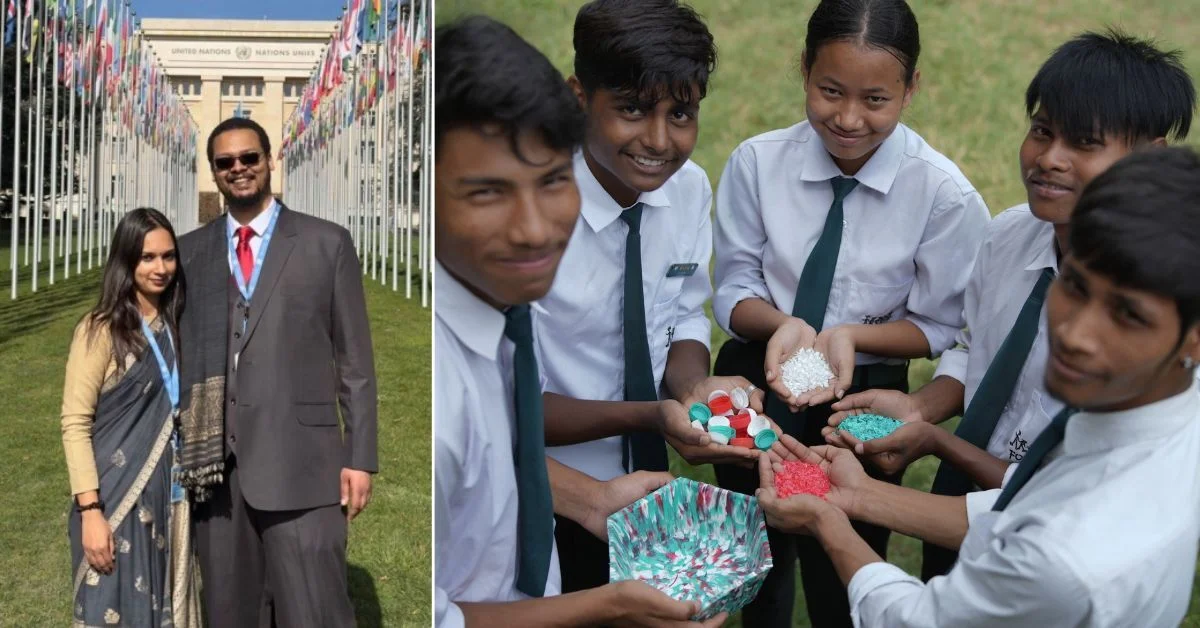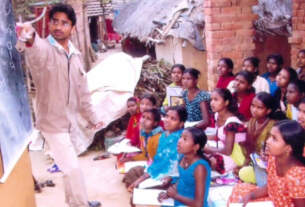By Bhalakatha
Every Friday, students from the Akshar School in Assam gather like eco-warriors on a mission. They arrive carrying a week’s worth of collected plastic, their hands and pockets filled with discarded bottles, wrappers, and more. Situated in the lush green Pamohi locality of Assam, this unique school has transformed education into an adventure and turned fees into a commitment to a brighter, more sustainable future.
Founded by Parmita Sarma and Mazin Mukhtar in 2016, Akshar School has a vision of breaking the cycle of poverty and instilling environmental awareness in the underprivileged youth of Assam. Parmita Sarma, the school’s founder, explains, “We wanted to make the coming generation from underprivileged sections break the circle of poverty and be environmentally sensitive. Education is the only way these goals can be achieved.”
So far, the school has collected and recycled approximately 1,200 bottles and a staggering 643,600 plastic wrappers through its students. In addition to its innovative approach to addressing plastic pollution, the school follows a unique style of education. Rather than placing students in grades based on their age, they assess students’ academic aptitude and assign them to the appropriate level.
Parmita Sarma’s journey into social work and education began in Mumbai, where she was born, but it was her upbringing in Guwahati, Assam, and her family’s political awareness that fueled her desire to make a difference. “After completing my master’s in social work, I decided to work in the field of education as I believe that education is an integral part of the process of breaking the cycle of poverty. I wanted to set up a free school,” she explains.
The heartwarming aspect of Akshar School’s fee structure is that it doesn’t require any monetary payment. Instead, students bring 25 pieces of plastic each week as their “fees” for the school. The land on which the school stands was generously donated by Parmita’s mother, who also provided some initial funds to kickstart the project.
The school’s journey wasn’t without its challenges. Initially, they faced resistance from villagers who preferred their children to work rather than attend school. However, the founders discovered a unique solution that changed the game. They learned that children in the area burned plastic bags and bottles during winter to keep warm. Recognizing the environmental and health hazards of this practice, the school decided to tackle this issue head-on.
“We asked all our kids to collect plastic all week and bring at least 25 pieces of plastic by the end of the week. Initially, no one took us seriously. When we told them that this was their fee, the students slowly started bringing plastic every Friday,” Parmita says.
To further incentivize attendance, the school began employing children who were skipping school for daily wage work. These students were paid to work at the school, and as they advanced in their studies, they took on teaching roles for younger students, earning pocket money in the process. This innovative model significantly boosted attendance, with around 200 students on the waiting list for admission by the end of 2016.
However, the school faced a new challenge when they observed parents taking money from their children’s earnings, often for personal expenses, including buying alcohol. To address this issue, the school introduced a point-based system, where each point had a monetary value. For instance, 50 points represented Rs 50, ensuring that the funds were spent solely on the child’s needs. The school partnered with local shops, allowing students to use their points for sweets and garments. The school then settled the bills with the shops on the students’ behalf, safeguarding their hard-earned money.
Moreover, the school introduced a bank to teach students money management and the importance of saving. Students could deposit their weekly points in the bank, encouraging savings for larger expenses. Many students saved diligently and were eventually able to purchase items like mobile phones with their savings.
At Akshar School, students are placed in grade levels based on aptitude rather than age. This approach allows older students who may have missed out on education due to poverty to catch up and learn at their own pace. Parmita Sarma notes, “This helped us connect with those older kids very well too.”
In the heart of Assam’s verdant paradise, Akshar School has not only provided quality education to underprivileged children but has also taken significant steps to address environmental concerns and empower the local community through innovative solutions. With its commitment to a brighter future, this remarkable school continues to inspire change.





